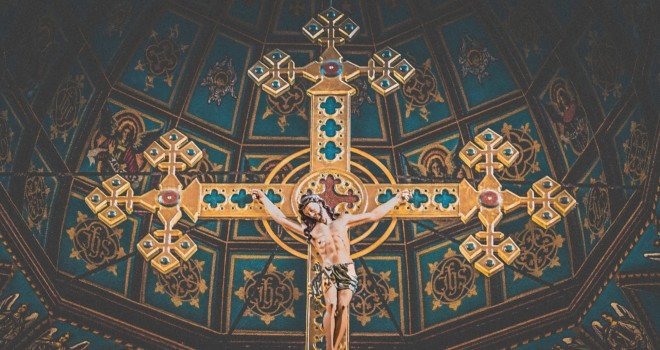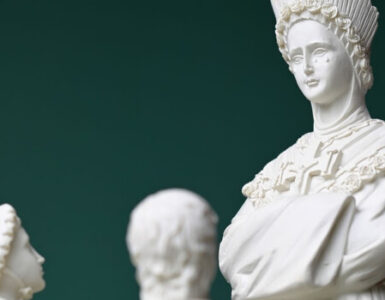I recently discovered the music of Rend Collective, a Christian Irish folk
band. I’ve been devouring their music and videos online, and I told my spiritual
director, “Ah…if only they were Catholic!”
Lest you think that I am anti-ecumenism, you should know
that many of my good friends at my public high school were faithful
Protestants. We listened to the same music. We occasionally broke out in theological
debates in Calculus class. And I was inspired by their love for God.
So, in desiring Catholicism for not only the members of this
band but also for others, I am not denigrating their fidelity to the Gospel. I’m
wishing that they could experience the gift of the Eucharist.
This debate – the value of conversion and belonging to the
Church – came to the fore during the recent Amazon Synod. But the discussion of
ecumenism is one that has long been going on in the Church. If Catholics
believe that God does work through other denominations of Christianity and that
non-Catholics do go to heaven – what is the point of wanting to convert people
to Catholicism?
The Eucharist is the point.
Ecumenism Explained to Children
When I am driving around with my young daughters, I make a
point of making the Sign of the Cross whenever we pass a Catholic Church, and
saying, “Love you, Jesus!” while blowing him a kiss. My daughters do the same
(and sometimes remind me to do it when I forget.) Inevitably, the toddler of
the group will blow kisses at every Church we pass, even the non-Catholic ones.
The older sisters will always chime in, “No, Zelie! Jesus isn’t in that Church!”
And I always respond, “Well, he is in
that Church. Those people love Jesus and pray to him. He is spiritually present
there. But we can still pray for them to become Catholic because we love the
Eucharist and we want everyone to get to have Jesus in the Eucharist.”
If we believe that the Eucharist is truly the Body and Blood
of Christ – how could we not desire it for everyone we know? How could we not
desire that they receive a foretaste of that heavenly union with Christ?
But the Eucharist is more than heavenly food – it is also a
sacrifice. To be present at Mass is to be present at the foot of the cross.
Praise and Worship vs. Worship
Several of my favorite bloggers, writers, and musicians are not Catholic (although most are Christian, too). Whether I am watching one of their Insta-stories, YouTube videos, or an interview, I am always struck by the depth of their love of and desire for Christ. Then, they begin to talk about worship, and it makes my heart ache for them.
This is not true for all non-Catholic Christians, but for
those whose witness I have been watching, worship of God consists mainly in
heartfelt prayer and song. Watching them pray and sing is beautiful and
heartfelt. It is a challenge to me, as a fellow Christian, to pray with the
same fervent devotion.
But, as I was listening to a recent episode of my favorite podcast , their discussion
of worship reminded me of what right worship looks like. (Note that “right
worship” is a theological term and is not contrasted with “wrong worship” but
rather is meant to indicate the fullness of the worship that God desires from his
people.) Worship is not just praising God, singing, or praying with devotion.
Worship is meant to be sacrifice.
When we look to the Old Testament, we see how God requires
sacrifice from the Israelites as a form of worship pleasing to him. Even
earlier than Israel, we see the value of sacrifice in worship in the story of
Cain and Abel. Both presented an offering to God, but only Abel presented a
sacrifice – the choicest portion of what he possessed. Abraham’s willingness to
sacrifice Isaac is pleasing (even though Isaac ends up being spared) because it
shows that he chooses to place worship of God above his own lesser desires, even
a desire as great at the desire for a son.
And, of course, all these sacrifices point to the final,
most perfect sacrifice. Christ’s sacrifice on the cross was one of perfect
love. In its perfection, it did away with any need for further sacrifices. It
was the perfect worship of the Father.
It is this sacrifice that is made present again at every
Mass. Jesus isn’t sacrificed repeatedly, but his one, perfect sacrifice is made
present here and now. When we are at Mass, we are literally and mysteriously
standing at the foot of the cross of Christ. It isn’t a new sacrifice, but the
same sacrifice offered 2000 years ago.
Although song and prayer can certainly be a part of praising
and worshiping God, we don’t need to create a way to worship. Christ has already
given us the most perfect form of worship. To worship God, no sacrifice or offering
of ours is great enough. And so, all we can do is unite our offerings to Christ’s
on the altar. In joining our sacrifices and sufferings to his at every Mass, we
can offer God true worship.
Most beautifully — we don’t offer that worship alone. In watching an interview with one Christian musician, he was talking about how his church community desired to have Christ in their midst and believe that he is in their midst. I, too, believe that Christ is in their midst spiritually.
But what I desire is for all Christians to one day be
united, partaking in the great sacrifice of Christ on the altar, the most perfect
act of worship. It is not perfect because of our own qualifications or talents.
It is perfect because all we are doing is presenting to the Father the perfect
sacrifice of his Son.
What a gift that perfect worship is.
✠
Photo by K. Mitch Hodge on Unsplash












